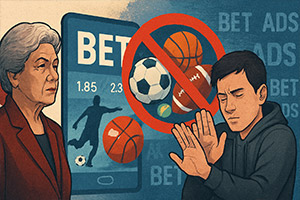 Senator Marty Deacon from Waterloo region is once again urging the federal government to take action against sports betting advertisements that could harm young people. Deacon’s Bill S-211 aims to ban sports betting ads during broadcasts where minors are likely to see them, addressing the harmful effects such ads may have on youth. The push is gaining traction after a recent editorial in the Canadian Medical Association Journal (CMAJ) raised concerns about the rise in gambling-related problems among children and teens.
Senator Marty Deacon from Waterloo region is once again urging the federal government to take action against sports betting advertisements that could harm young people. Deacon’s Bill S-211 aims to ban sports betting ads during broadcasts where minors are likely to see them, addressing the harmful effects such ads may have on youth. The push is gaining traction after a recent editorial in the Canadian Medical Association Journal (CMAJ) raised concerns about the rise in gambling-related problems among children and teens.
Deacon has been outspoken on this issue since 2023 and is now calling for a national approach to regulate sports betting advertisements, which currently lack sufficient oversight. “It’s an addictive behavior… it’s a great health concern,” Deacon stated in an interview with The Morning Edition. Her bill seeks to address the growing exposure of young people to sports betting ads, which are increasingly pervasive in sports media.
Bill S-211: A Comprehensive Approach to Gambling Ads
Bill S-211 proposes a national framework to regulate sports betting ads, similar to how alcohol and tobacco advertisements are managed. The bill would prohibit celebrities and athletes from appearing in gambling commercials and restrict the timing and placement of these ads, particularly during live sports events. Senator Deacon believes Canada needs to implement a consistent national standard, rather than leaving the issue to provincial authorities. “We need a common approach, a national standard similar to alcohol, similar to tobacco ads, that is not patchwork,” she said. “The government has to take the lead on this.”
The senator’s efforts are motivated by the increasing risks that gambling ads pose to youth, an issue that has been underlined by health professionals like Dr. Shannon Charlebois, who co-authored the editorial in CMAJ. The editorial highlights that young people’s developing brains are particularly vulnerable to the normalization of gambling behaviors. Dr. Charlebois warns that continuous exposure to gambling ads can encourage unhealthy habits, particularly for teens who are genetically predisposed to enjoy risk-taking behavior.
Evidence of Harmful Effects: Stories from the Medical Frontline
Health professionals, including Dr. Charlebois and Dr. Shawn Kelly, have reported a rise in gambling issues among youth. Dr. Kelly, who treats addictive behaviors, noted that he has seen an increase in gambling among children under the legal age. “The typical story that I see in the clinic is a 13- or 14-year-old boy who has borrowed dad’s credit card, or mom’s credit card, engaged in some online wagering, and lost a significant amount of money,” he shared. The negative consequences of this behavior can go beyond financial troubles, with increased rates of substance abuse, delinquency, and even suicidality linked to gambling.
Dr. Charlebois further explains that the accessibility of gambling through smartphones has exacerbated this issue. She emphasizes that the combination of easy access to betting sites and the normalization of gambling ads is a dangerous mix for adolescents.
The Pervasiveness of Sports Betting Ads in Canada
Timothy Dewhirst, a professor at the University of Guelph, echoed the concerns about the ubiquity of gambling ads. “When I’m watching sports on TV, it’s just filled with ads for sports betting companies,” Dewhirst said. “You see them on player jerseys, in sports updates, on fields, and even on ice rinks.” He specifically pointed out the growing popularity of “parlay” bets, where multiple outcomes are combined into one wager. These bets are particularly concerning because a single loss causes the entire bet to fail, potentially leading to significant financial losses.
Dewhirst also noted that the advent of mobile technology has made gambling more accessible to youth. With smartphones, young people can now place bets easily and quickly, a situation that wasn’t possible in the past when gambling required a physical presence at casinos or sportsbooks.
A Growing Call for Action
As the number of gambling ads continues to rise, both Deacon’s Bill S-211 and the growing body of medical evidence point to the urgent need for federal intervention. Health professionals argue that, in addition to limiting advertisements, the government must also address the increasing risks associated with the normalization of gambling behaviors among minors.
Deacon hopes that her bill will lead to meaningful changes and serve as a step toward protecting youth from the dangers of sports betting. “It’s time to protect young people from the damaging effects of gambling advertisements,” she concluded.
Source:
Senator for Waterloo region wants to ban sports betting ads that lead to ‘addictive behaviour’ in youth, cbc.ca, September 12, 2025.



















